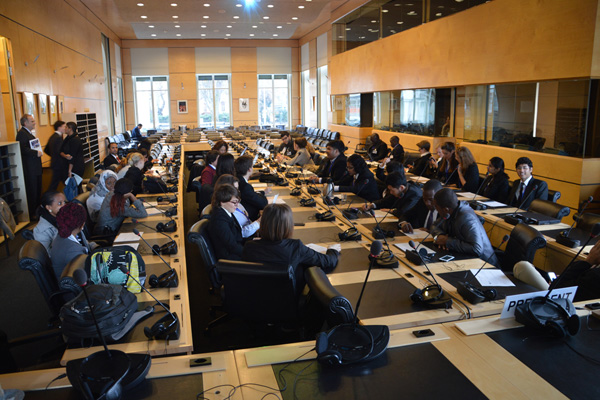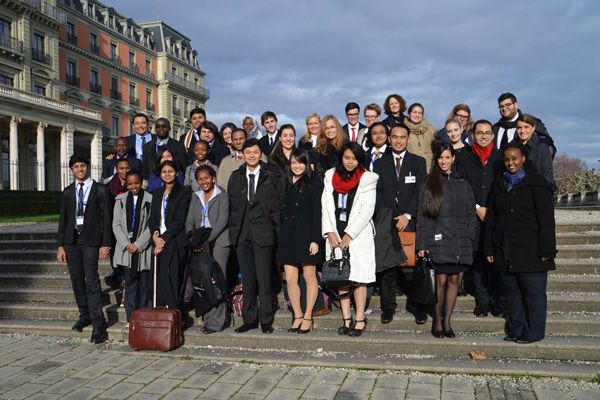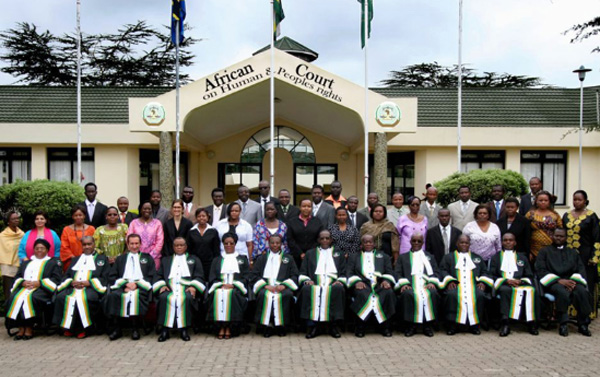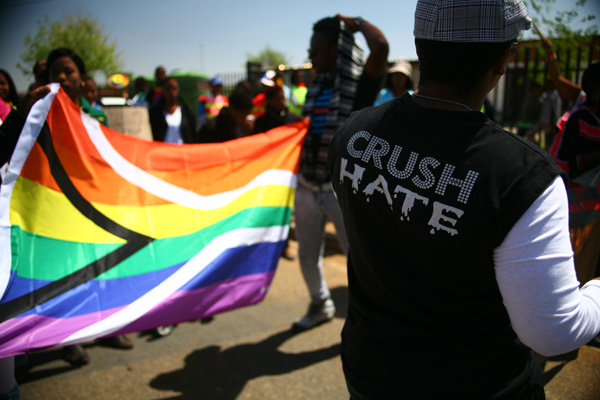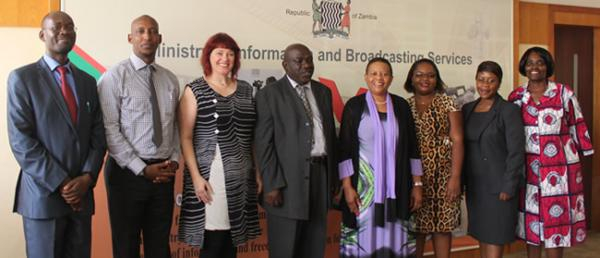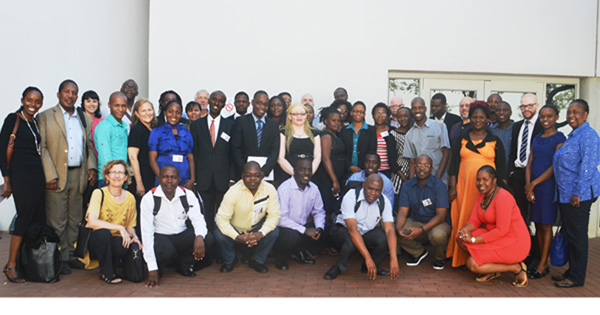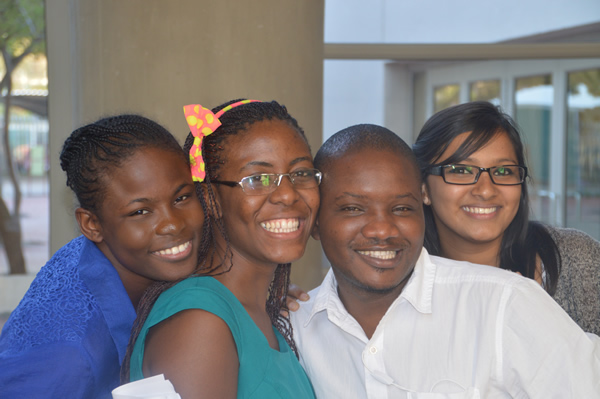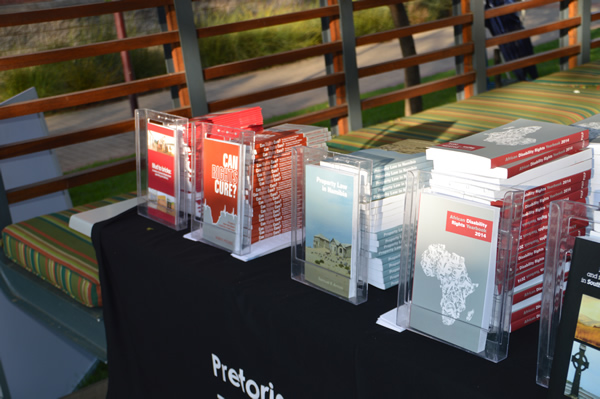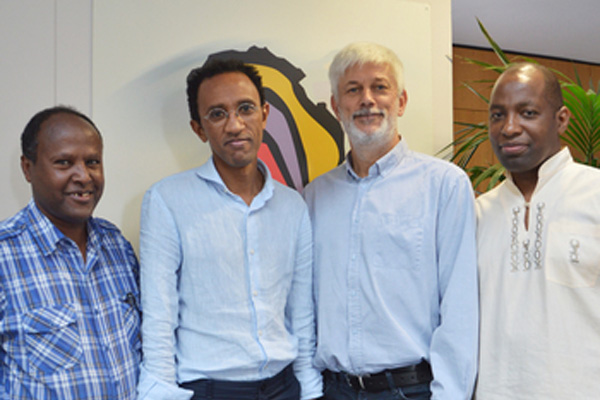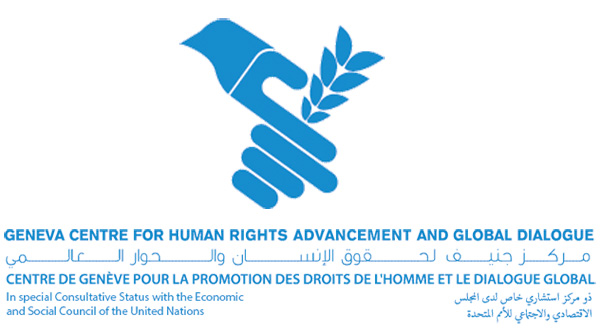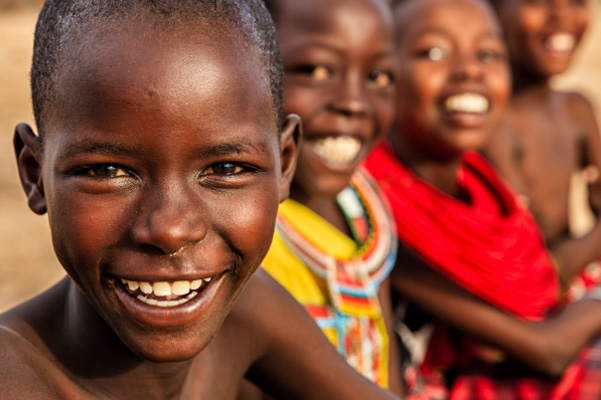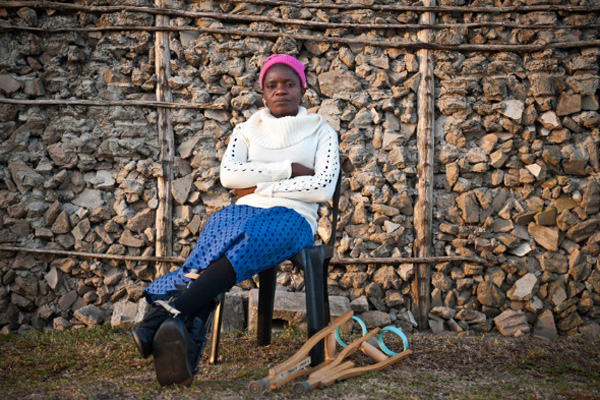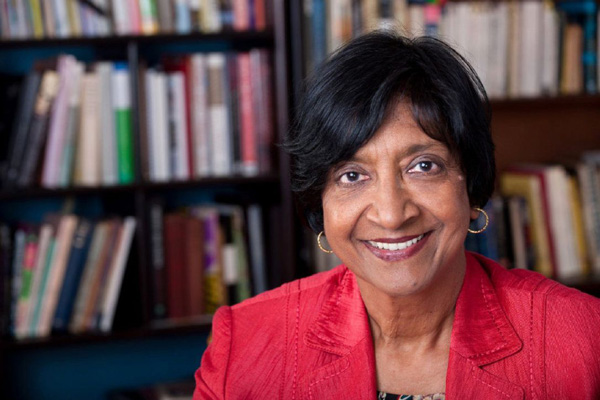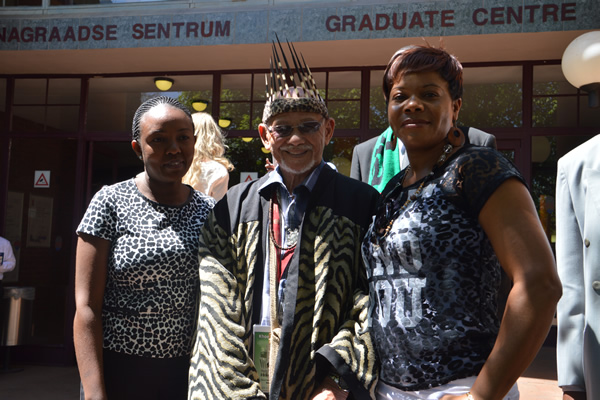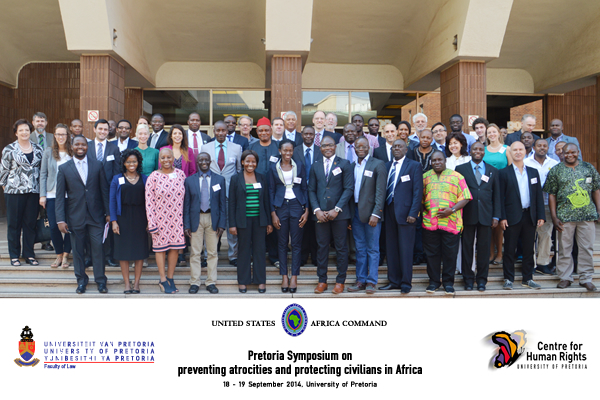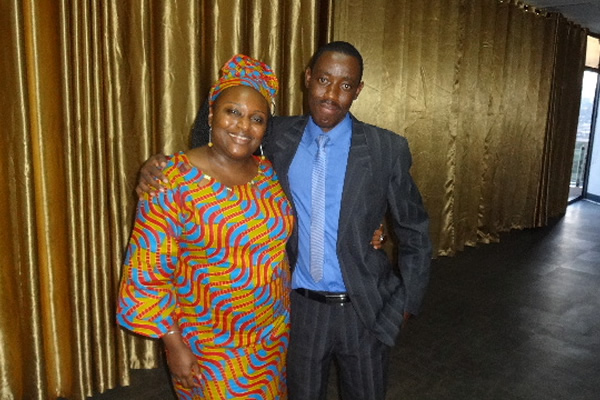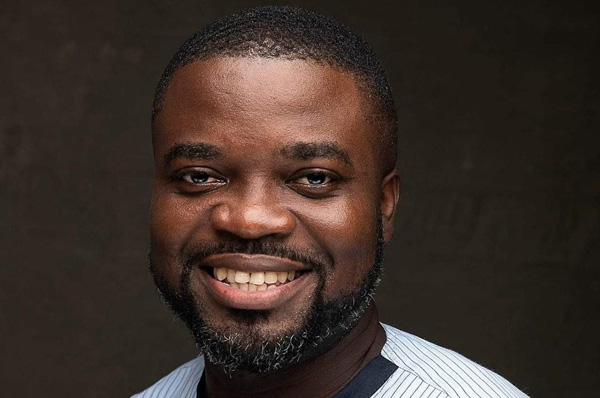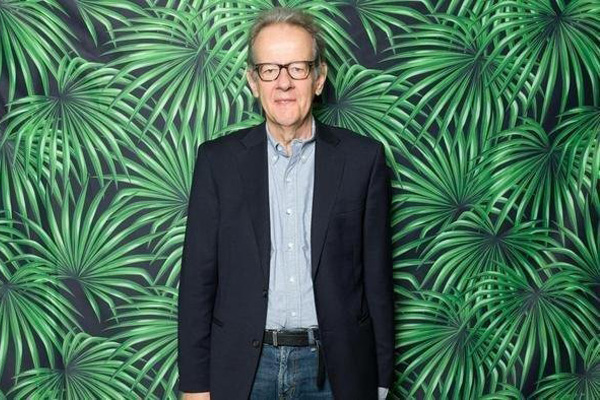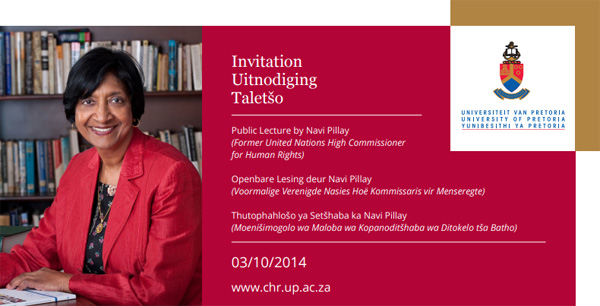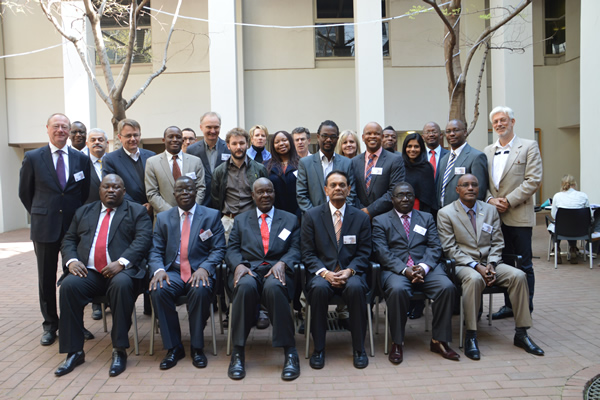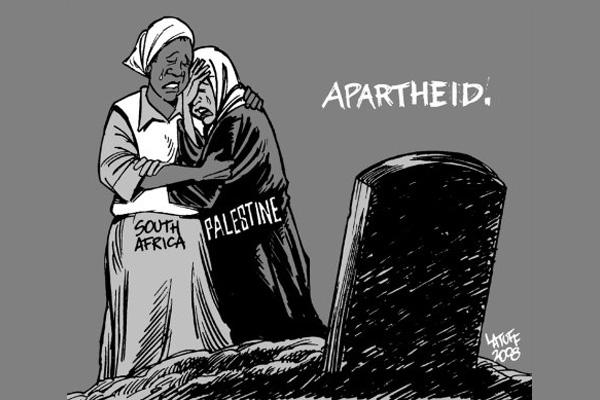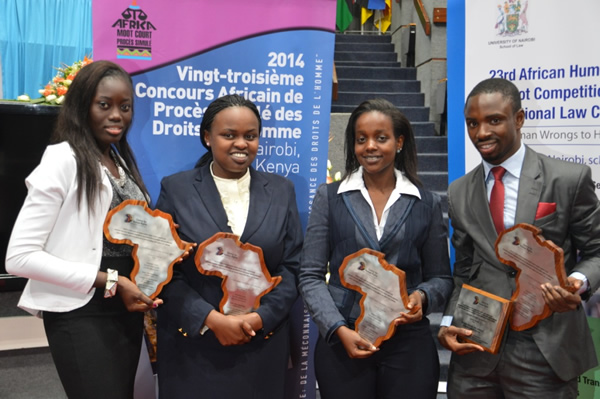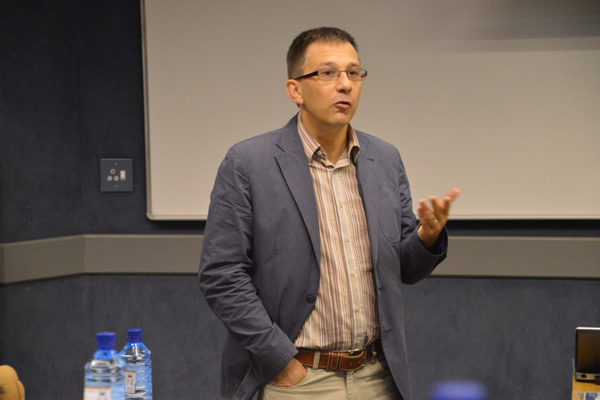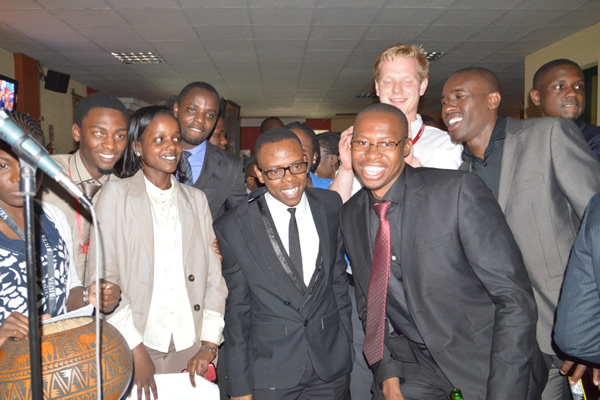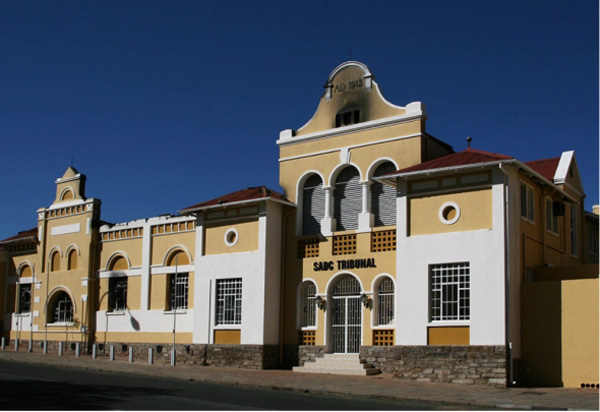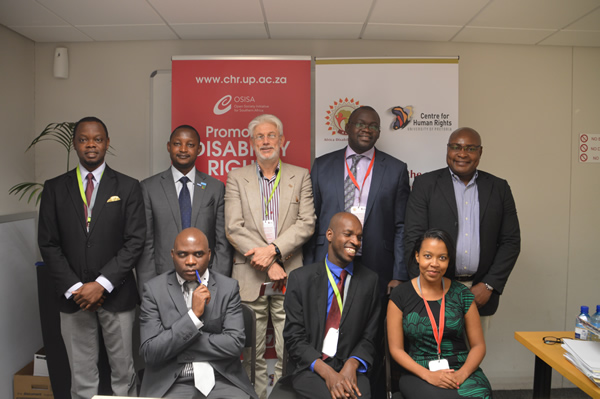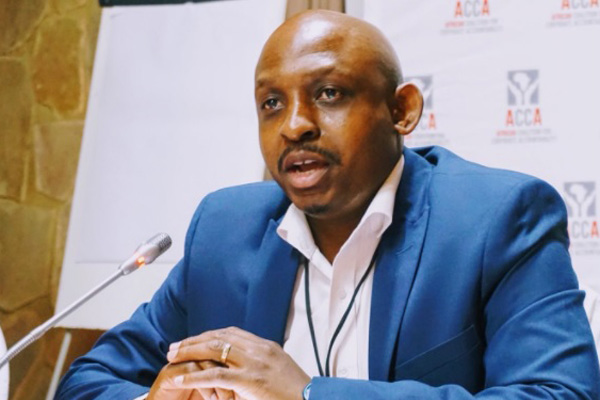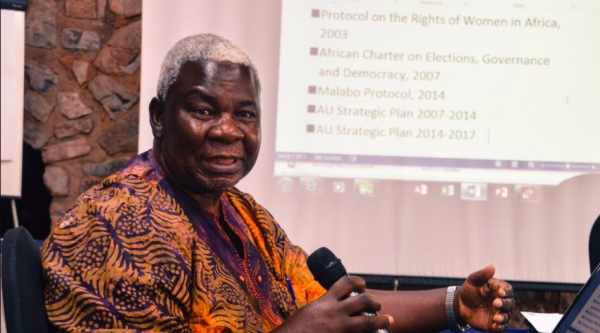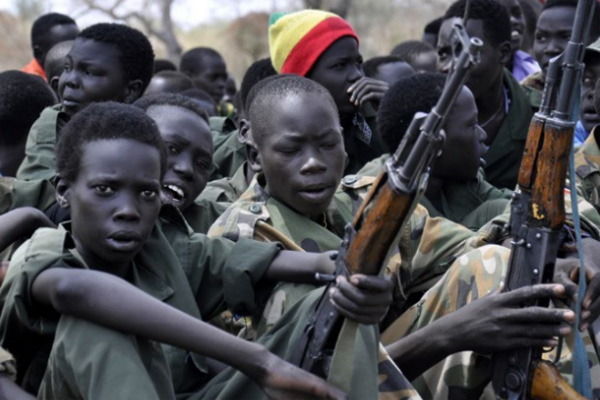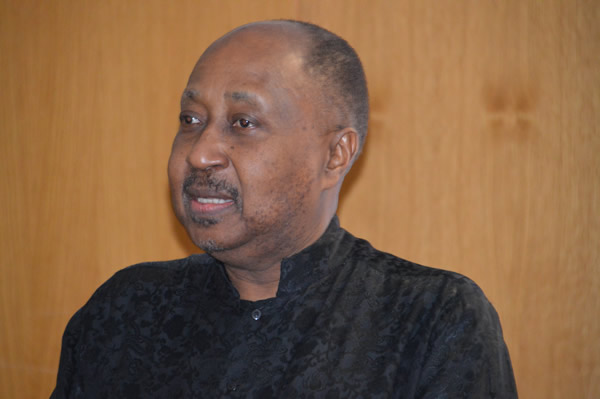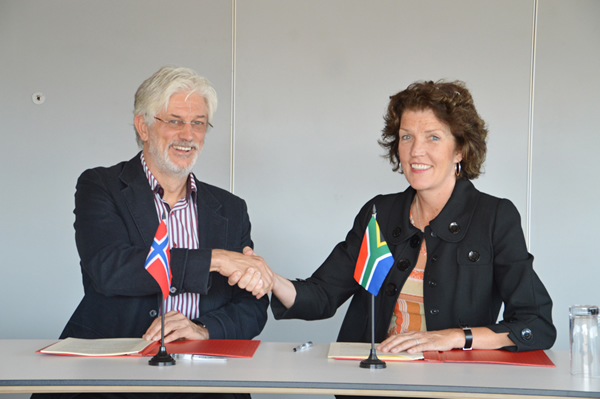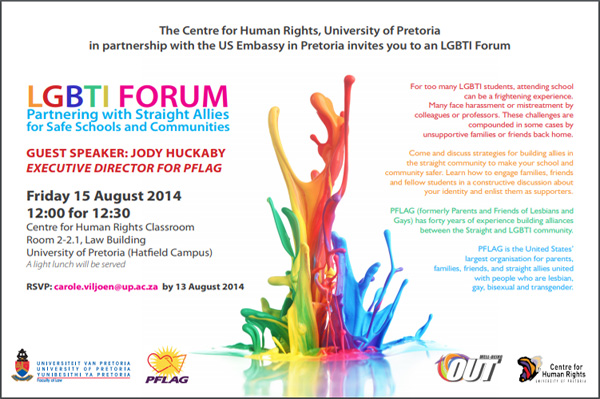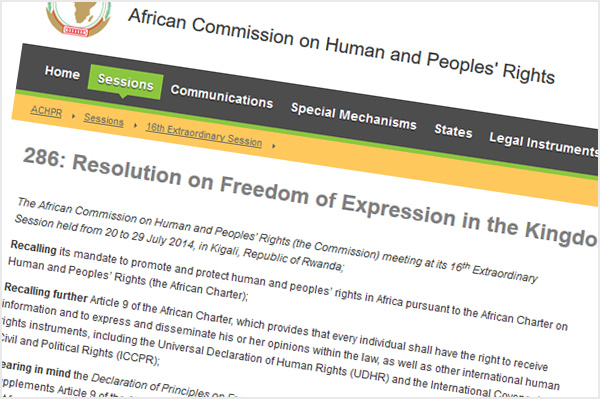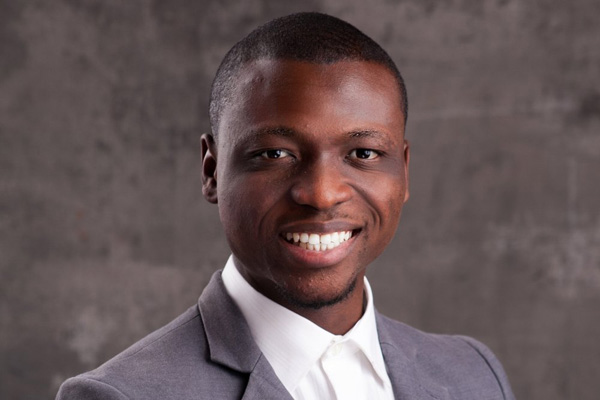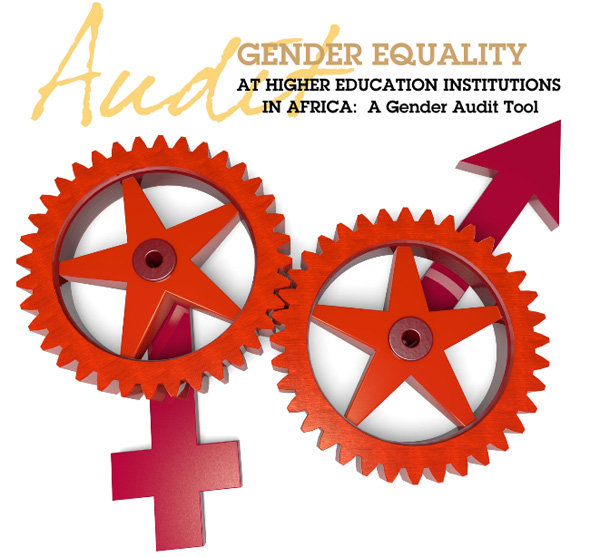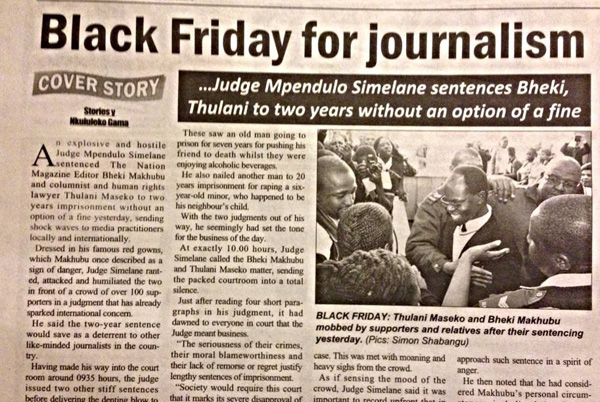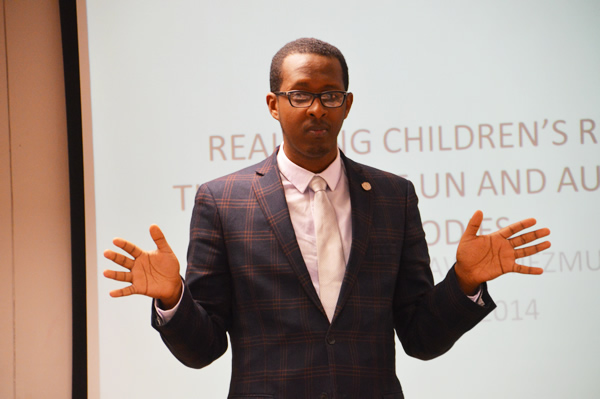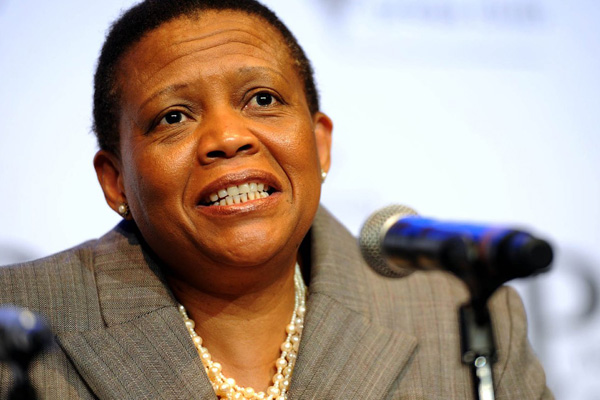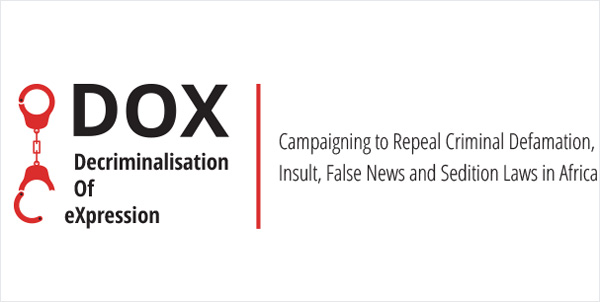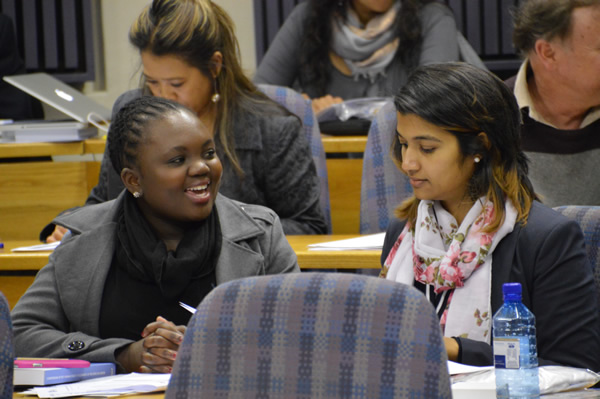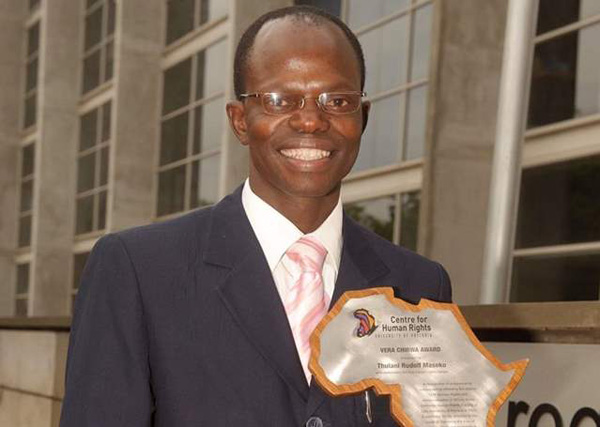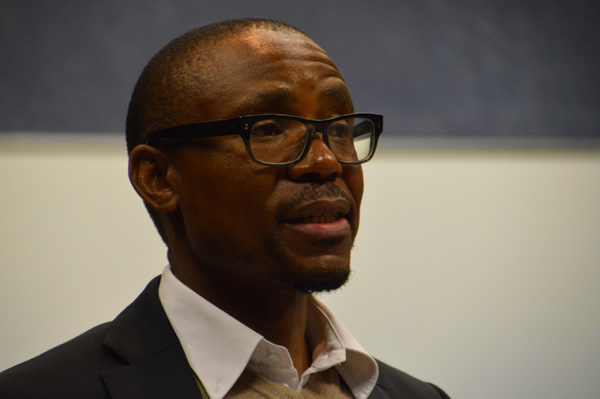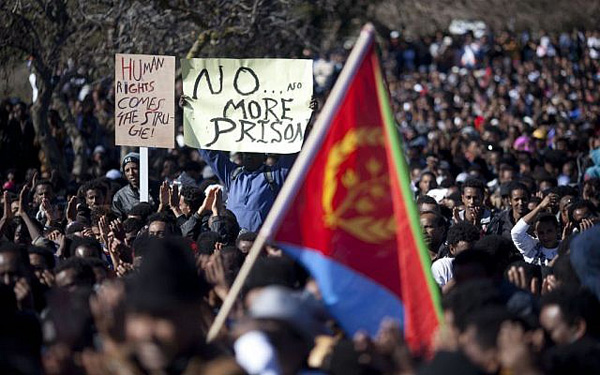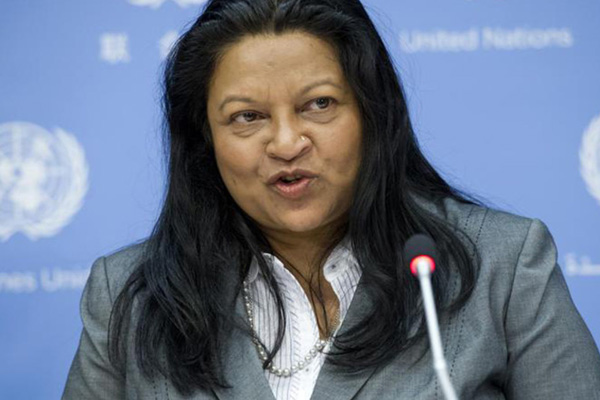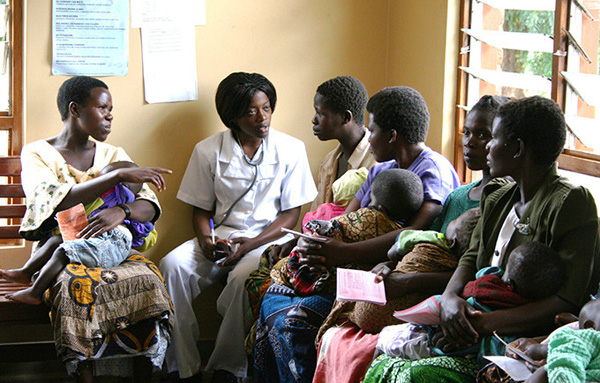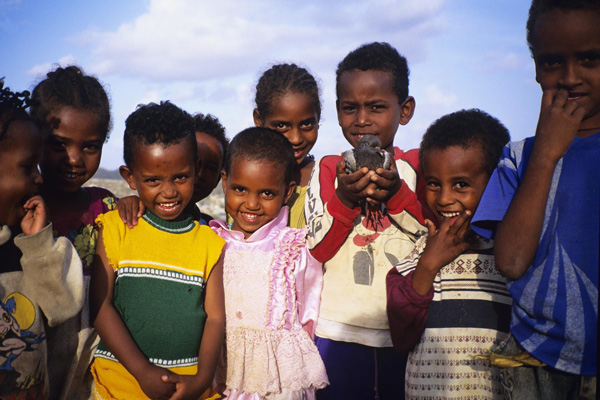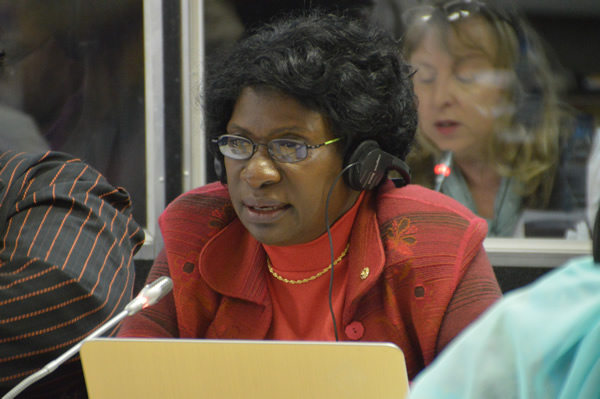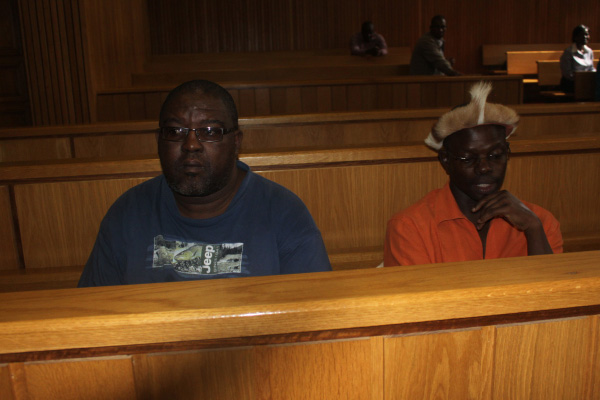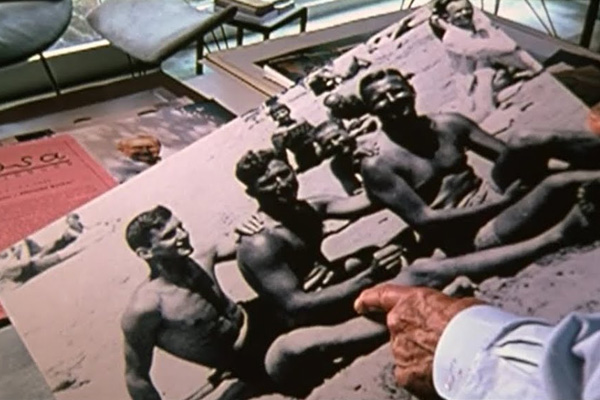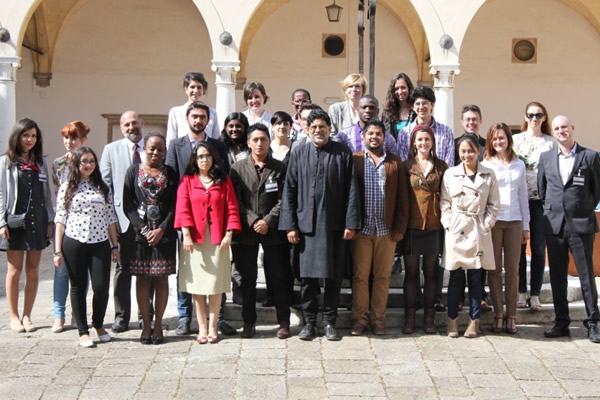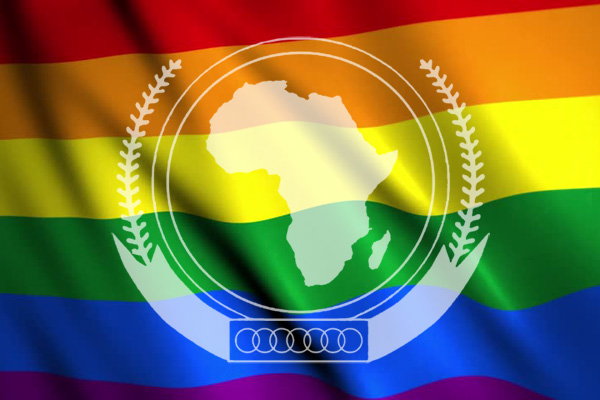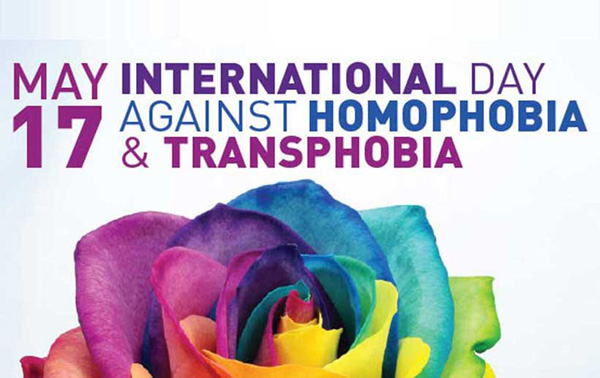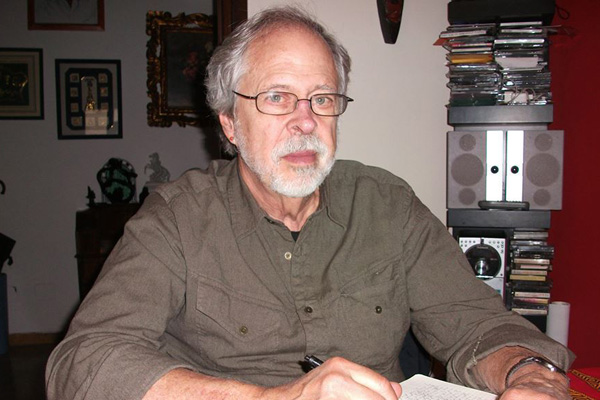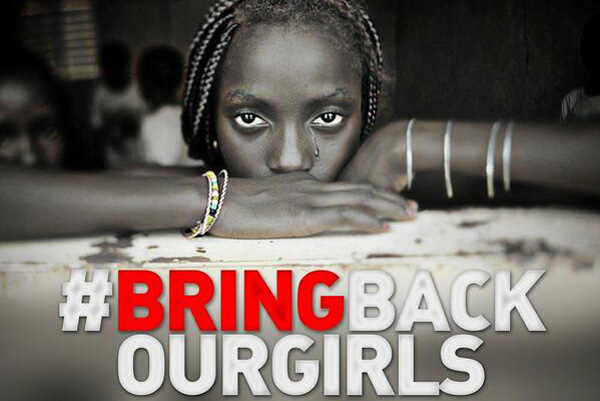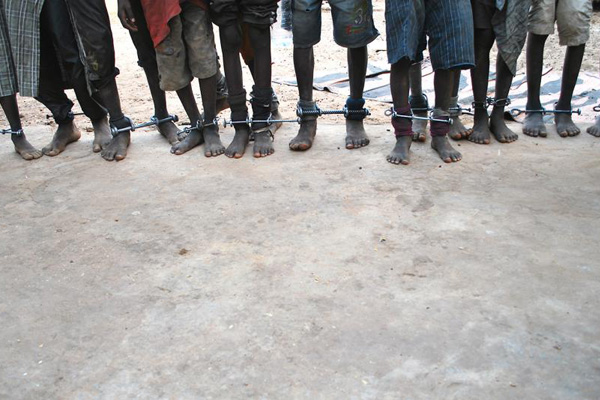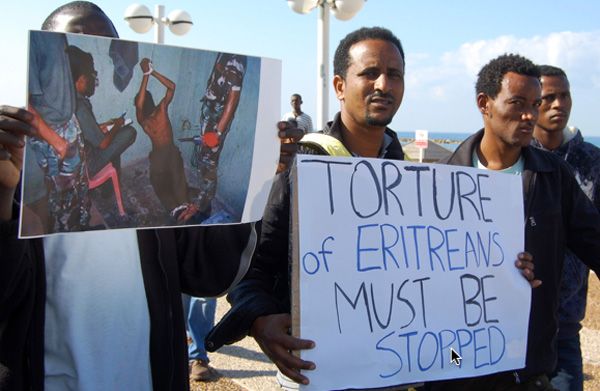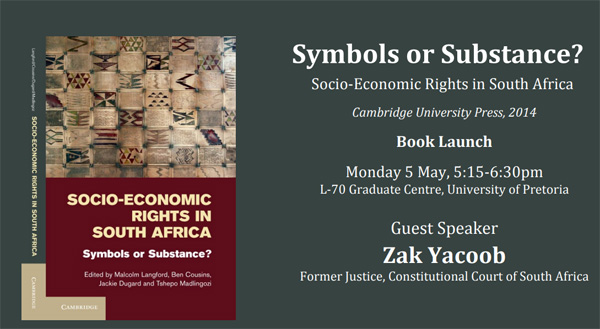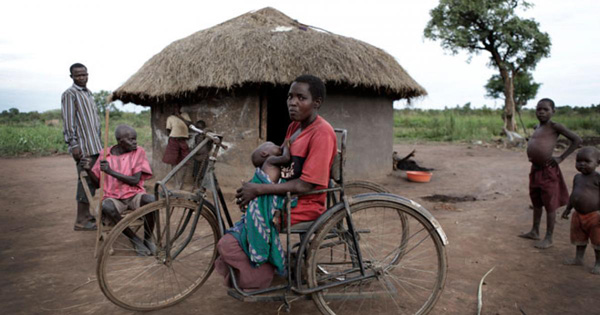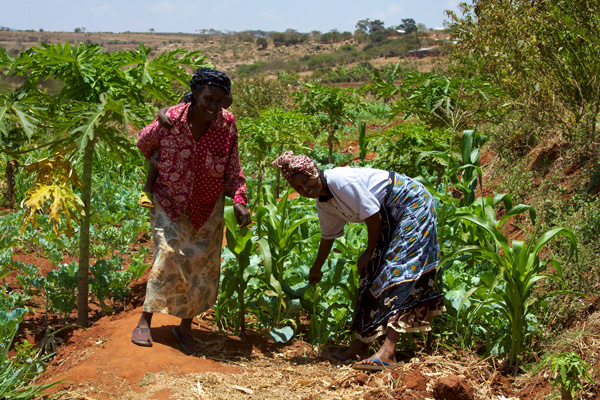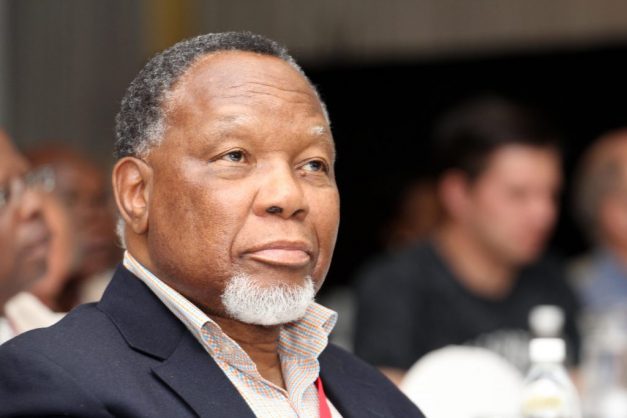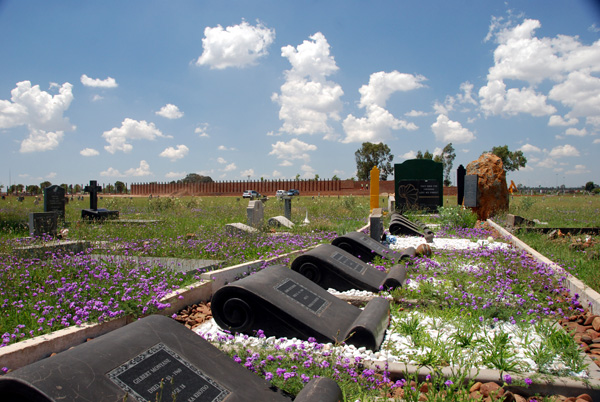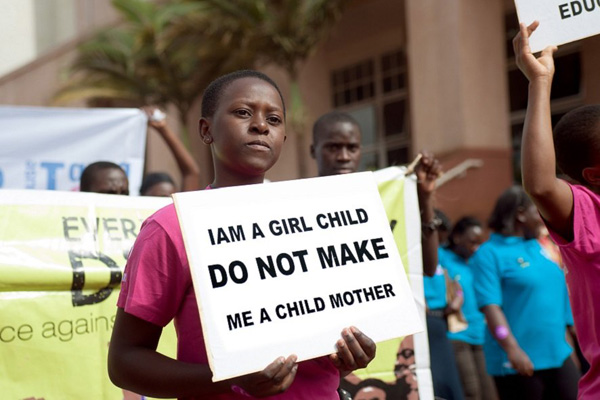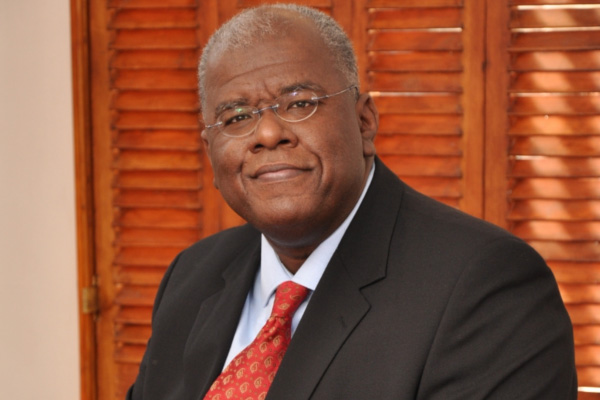- Details
On 10 December 2014, the University of Pretoria held a graduation ceremony for students from the Masters programmes offered by the Centre for Human Rights and the Faculty of Law in the University of Pretoria. There were also some doctoral candidates who graduated on this occasion. The Graduation Ceremony marked the 15th Graduation Ceremony of students from the Master’s in Human Rights and Democratisation in Africa offered by the Centre for Human Rights. Each year, the Centre's human rights students graduate on International Human Rights Day (10 December 2014).
Ms Philina Wittke, Head of the DAAD South Africa Information Center delivered the keyonote speech.
- Details
The 6th Nelson Mandela World Human Rights Moot Court Competition was held in Geneva, Switzerland from 8 to 10 December 2014. Established in 2009, the main objective of the competition is to bring together students, law professors and human rights lawyers from different legal systems to debate and discuss contemporary cross-cutting human rights issues. The competition is organised in collaboration with the United Nations Office of the High Commissioner for Human Rights.
After being held in Pretoria for the 5 past years, the United Nations Offices in Geneva hosted the Competition for the first time in 2014. The executors of the estate of the late President Nelson Mandela granted permission for the competition to be named after the great statesman and human rights icon, Nelson Mandela (the event was previously simply called ‘World Human Rights Moot Court Competition’).
- Details
The Sixth Nelson Mandela World Human Rights Moot Court Competition will be held from 8 to 10 December 2014, at Palais des Nations in Geneva, and will bring together 45 participants from 15
universities in 12 countries, representing all 5 United Nations regions of the world.
Teams from universities in the following countries have qualified to participate in the final round of the 6th World Human Rights Moot Court Competition, which will for the first time be called the Nelson Mandela World Human Rights Moot Court Competition: Argentina, Australia, Belarus, Greece, India, Indonesia, Kenya, Singapore, Slovenia, Poland, Switzerland and South Africa.
- Details
The Centre for Human Rights, University of Pretoria, has welcomed a decision of the African Court on Human and Peoples’ Rights in the case of Konaté v Burkina Faso to rule that imprisonment for defamation violates the right to freedom of expression and that criminal defamation laws should only be used in restricted circumstances.
The highest court in Africa, in its judgement handed down on 5 December 2014, in Addis Ababa, sent a strong message that governments may not use severe criminal penalties to stifle public debate and reporting on matters of public interest.
- Details
On 8 and 9 December 2014, the Centre for Human Rights hosted a Colloquium on the theme ‘Sexual Minority Rights: Charting the Way Forward’.
This event comes in the wake of the adoption of increasingly repressive laws in many African countries (such as The Gambia, Nigeria and Uganda), on the one hand, and the adoption by the African Commission on Human and Peoples’ rights of its first resolution on sexual orientation and gender identity (SOGI), on the other. Speakers at the Colloquium touched upon the situation pertaining to the rights of lesbian, gay, bisexual, transsexual and intersexed (LGBTI) persons in Southern, West/Central and Eastern Africa.
- Details
On 12 and 13 November 2014, the Special Rapporteur on Freedom of Expression and Access to Information in Africa (the Special Rapporteur), Commissioner Pansy Tlakula, in collaboration with the Centre for Human Rights, Media Institute of Southern Africa Zambia (MISA-Zambia), and members of the Decriminalisation of Expression (DOX) Campaign, organised a stakeholders meeting on the decriminalisation of laws limiting Freedom of Expression, in Lusaka, Zambia.
- Details
The Centre for Human Rights at the Faculty of Law, University of Pretoria cordially invites you to the LLM/MPhil (Human Rights and Democratisation in Africa) Class of 2014: Graduation Ceremony
During an intensive one-year course, students on this programme are taught by eminent lecturers in the field of human rights and gain invaluable practical exposure. It is the only course of its kind in Africa.
- Details
The Gender Unit of the Centre for Human Rights organised a 3-day workshop on increasing States’ capacity for reporting under the Protocol to the African Charter on Human and Peoples’ Rights on the Rights of Women in Africa (the Women’s Protocol). This was organised in collaboration with the Special Rapporteur on the Rights of Women in Africa of the African Commission on Human and Peoples’ Rights (African Commission), Commissioner Soyata Maiga. The workshop was held from 11 to 13 November 2014 at the Farm Inn Hotel, Pretoria.
Thirty key government and civil society stakeholders involved in the state reporting process in Tanzania, Seychelles, Zimbabwe and the Democratic Republic of Congo attended this workshop.
- Details
On 4 and 5 November 2014, the Centre for Human Rights, University of Pretoria, hosted an academic conference on disability rights with a focus on the effective implementation of the rights of women with disabilities in Africa. Fifteen papers were presented at the conference, on a diverse range of issues including political participation, access to education, sexual and reproductive rights, building an inclusive environment, resource allocation, access to justice and violence against women with disabilities. The conference drew participants from more than 15 countries and approximately 50 people attended the conference. Participants included persons with disabilities, their families, civil society groups as well as advocates for disability law reform, lawyers, policy makers, academics and practitioners from around the world.
- Details
On 3 and 5 November 2014 the Centre for Human Rights, with the support of OSISA, hosted the Second Southern African Disability Rights Moot Court Competition. Participants from the Network of Southern African Law Schools Disability Rights Programme participated in the second edition of this competition.
The problem being argued during the rounds concerned itself with issues regarding the rights of persons with disabilities including the right to vote for persons with intellectual disabilities.
- Details
The Pretoria University Law Press (PULP) held a book launch on Tuesday 4 November 2014, where seven of PULP's latest titles were introduced. PULP's third open-access online journal, the African Disablity Rights Yearbook, was also launched and can be viewed by visiting www.adry.up.ac.za.
The seven titles launched included:
- Can rights cure? The impact of human rights litigation on South Africa’s health system
– Author: Marius Pieterse - monograph - African Disability Rights Yearbook 2014
– Editors: Charles Ngwena; Ilze Grobbelaar-du Plessis; Heléne Combrinck; Serges Djoyou Kamga – journal and open access online journal - Promoting effective enforcement of the prohibition against corporal punishment in South African schools
–Written by Faranaaz Veriava, Commissioned by the Centre for Child Law, University of Pretoria - Mud to bricks: A review of school infrastructure spending and delivery
- Written by Carmen Abdoll and Conrad Barberton, Economists with Cornerstone Economic Research, Commissioned by the Centre for Child Law, University of Pretoria - Human dignity and fundamental rights in South Africa and Ireland
– Dr Anne Hughes Trinity College, Dublin - monograph - Property law in Namibia
– Prof Sam Amoo- Acting Director - Justice Training Centre (JTC) Faculty of Law, University of Namibia - monograph - Transformative constitutionalism: Comparing the apex courts of Brazil, India and South Africa
– Editors: Oscar Vilhena, Upendra Baxi and Frans Viljoen – collection of work from various authors'
- Details
The human rights situation in Eritrea was the subject of attention of key decision-makers who met to discuss the challenges faced in that country. The situation in Eritrea resulted in thousands of Eritreans fleeing the country, sometimes under dangerous conditions.
The Centre for Human Rights in collaboration with the Eritrean Movement for Democracy and Human Rights (EMDHR) hosted a seminar on human rights in Eritrea on Wednesday 29 October 2014. Participants in the event included key decisions makers in South Africa and members of the diplomatic corps who were drawn from Africa, Europe and the Middle East. Also present were members of the Eritrean community in the diaspora. The seminar commenced with welcome remarks from Prof Frans Viljoen, the Director of the Centre for Human Rights.
The aim of the seminar was to create awareness about the prevailing human rights situation in Eritrea and to discuss the international response.
Mr Mussie Ephrem, a Swedish-Eritrean who is an analyst specialising in the Horn of Africa, began by providing a comprehensive background into the history of Eritrea. He explained how the country had through the years evolved from efforts to liberate its people from oppression only to descend into one of the most repressive states as far as human rights are concerned.
- Details
The Geneva Centre for Human Rights Advancement and Global Dialogue is a non-governmental, non-profit organisation based in Geneva, Switzerland. It works in cooperation with the United Nations Office of the High Commissioner for Human Rights and the United Nations Human Rights Council to promote and protect human rights through global dialogue. Its work brings together the full spectrum of national non-governmental and international human rights actors, through international conferences, human rights training, and advice to governments and related agencies.
The Centre for Human Rights of the University of Pretoria is both an academic department and a non-governmental organisation, which was founded in 1986 as part of domestic efforts against the apartheid system of that time. Its work mainly focuses on human rights awareness and education in Africa, as well as on the promotion and protection of the rights of women, indigenous peoples, and other disadvantaged and marginalized persons or groups across the continent.
Workshop to raise awareness among Southern African CSOs on children’s rights monitoring and advocacy
- Details
The Children’s Unit of the Centre for Human Rights of the University of Pretoria, the Child Rights Networks of Southern Africa (CRNSA) and Plan International is organising a Workshop for Southern African CSOs on Child Rights monitoring and advocacy.
Dates: 11-13 November 2014
Venue: University of Pretoria, Pretoria, South Africa
- Details
The Centre for Human Rights at the Faculty of Law, University of Pretoria cordially invites you to a conference on the effective implementation of the rights of women with disabilities in Africa.
The Conference is on the theme ‘Overcoming obstacles: Towards the effective implementation of the rights of women with disabilities in Africa’ and will be presented by scholars, practitioners and disability activists from all over the world, but particularly from Africa.
Date: 4 and 5 November 2014
Time: 09:00 to 17:00
Venue: Auditorium,Plant Sciences Building, Hatfield Campus, University of Pretoria, Pretoria, South Africa
RSVP: Kindly confirm your attendance by Friday 31 October 2014 by sending an email to carole.viljoen@up.ac.za
Enquiries: Ms Carole Viljoen (012 420 3810 / carole.viljoen@up.ac.za)
GPS: 25°45’16.5”S 28°14’01.5”E
No registration fee is charged but pre-registration is compulsory.
- Details
The Centre for Human Rights was on Friday 3 October 2014 privileged to play host to Ms Navi Pillay, former United Nations High Commissioner for Human Rights. She delivered a public lecture on her work as High Commissioner in the Senate Hall of the University of Pretoria.
In her introduction, Prof Cheryl de la Rey, Vice-Chancellor and Principal of the University of Pretoria, spoke of Ms Pillay’s background in the anti-apartheid struggle as the first black woman to qualify as an advocate in the Natal Province, the first woman to open her own legal practice, and the first South African woman to obtain a Doctorate in Law from Harvard University. She described Ms Pillay as a great friend and supporter of the University of Pretoria and especially of the Centre for Human Rights, with which she has been associated for some 20 years. Ms Pillay was awarded the 2001 Women in Law Award by the Centre for Human Rights, and is the recipient of an Honorary Doctor of Laws degree from the University of Pretoria (December 2009).
- Details
The penultimate advanced human rights short course for this year was presented by the Centre for Human Rights at the University of Pretoria on - Indigenous Peoples’ Rights. It ran from 15 through 19 September, attracting participants and facilitators from across the world.
The UN Declaration on the Rights’ of Indigenous Peoples adopted by the UN General Assembly in 2007 came to the fore once more as participants engaged on the concept of ‘Indigenous Peoples’, land rights, gender views, international and national standards, regional mechanisms, climate change, challenges of and relevant ILO instruments relating to Indigenous Peoples’ Rights.
Participant’s views
“This course has given new strength and energy to engage the non-government and government for a process forward. My call is for an African Indigenous Network Alliance.
– Paramount Chief! Kora Hennie van Wyk, South Africa.
“The course provides a golden opportunity to participants from all-over Africa to interact, learn and share ideas and strategies on advocacy for the rights of indigenous peoples’.”
– Achero David Mufuayia, Kenya.
- Details
The Centre for Human Rights, Faculty of Law, University of Pretoria, South Africa, with the assistance of the United States Africa Command (AFRICOM) through the Africa Military Law Forum (AMLF), held a symposium at the University of Pretoria, South Africa, from 18 to 19 September 2014 on the theme: “All Means Necessary”: Bridging the Gap between the Doctrine of R2P and the Actual Protection of Civilians in Armed Conflicts.
The Symposium brought together over 80 high ranking military officers of African states, academics, policy makers, and other practitioners in the field of protection of civilians who discussed, shared experiences and provided lessons learnt in order to find solutions to the legal, policy, and practical challenges involved in the drafting and adoption of the mandates for the protection of civilian (PoC) by the United Nations (UN) Security Council and their implementation on the ground.
- Details
On 9 and September 2014, the Centre for Human Rights, in collaboration with the Open Democracy and Sustainable Development Initiative (ODESUNDI) and the Open Society Justice Initiative, held a meeting with local stakeholders on in Kigali, Rwanda on the implementation of the project on utilising access to information for the realisation of sexual and reproductive health rights of women in Rwanda.
- Details
Mr Joojo Cobbinah, a Ghanaian alumnus of the Human Rights and Democratisation in Africa (HRDA) masters’ programme (2013) was arrested on Saturday, 6th September 2014 on the orders of the Chief Executive of the Accra Metropolitan Assembly (AMA), also known as the Mayor of Accra.
Mr Cobbinah (the 2011 Human Rights Defender Award recipient and 2009 GJA Best Health Reporter) who is a journalist and a producer with Multi TV had gone with a team to film the living conditions of the people of Mensah Guinea community. This was after the AMA had demolished their houses upon a three days notice, rendering them homeless. As a result some of those displaced including women and children, slept in the open for lack of alternative housing arrangements.
- Details
The Centre for Human Rights and the Department of Mercantile Law at the Faculty of Law, University of Pretoria, invites you to a talk by Prof Nick Huls from Leiden University, The Netherlands on
‘Rwanda: Rule of Law in the Mist’.
Prof Nick Huls has worked for a couple of years in Rwanda with judges, prosecutors and legislative drafters. After explaining the title of his talk, he will discuss the strengths and weaknesses of the core institutions of the Rwandan legal system.
- Details
The Centre for Human Rights, Faculty of Law, University of Pretoria, cordially invites you to a public lecture by Navi Pillay.
Navi Pillay is the former United Nations High Commissioner for Human Rights and will reflect on her time at the UN and discuss future human rights challenges.
- Details
The Centre for Human Rights, Faculty of Law, University of Pretoria, in collaboration with the Konrad Adenauer Stiftung, held a Round Table to discuss the restoration of the Southern African Development Community (SADC) Tribunal on 28 and 29 August 2014.
![]() Download the concluding statement
Download the concluding statement
![]() Download a detailed recap of the Round Table
Download a detailed recap of the Round Table
The Round Table was attended by different stakeholders including former judges of the SADC Tribunal; a former judge of the East African Court of Justice (EACJ); officials from the SADC Tribunal, EACJ and Economic Community of Western African States (ECOWAS) Court of Justice; lawyers from private and academic practice and officials from the Department of Justice, South Africa; the South African Law Society; researchers; and members of civil society.
- Details
The Centre for Human Rights, Faculty of Law, University of Pretoria, invites you to a talk by Prof Robert Wintemute from King’s College, London on ‘Israel-Palestine Through the Lens of Racial Discrimination Law: Is the Analogy with South African Apartheid Accurate?’
- Details
The combined team from the University of Nairobi, Kenya and the Université Gaston Berger Saint-Louis du Sénégal , who argued for the Applicant are the winners of the 23rd African Human Rights Moot Court competition.The runners-up, arguing for the Respondent, are the teams from University of Pretoria, South Africa and Université Félix Houphouët-Boigny, Côte d'Ivoire.
The winning team members are:
- Eva Wangui Kimani, University Of Nairobi
- Moreen Wanjiru Mwangi, University Of Nairobi
- Mansour Fall, Université Gaston Berger De Saint Louis, Senegal
- Marguerite Ounane Thiare, Université Gaston Berger De Saint Louis, Senegal
The runners-up are:
- Alastair Dey Van Heerden, University Of Pretoria
- Ralph Tinomutenda Chitambira, University Of Pretoria
- Nadia Colette Wadja, Université Félix Huphouet Boigny Abidjan, Côte d'Ivoire
- Yacouba Sylla Koita, Université Félix Huphouet Boigny Abidjan, Côte d'Ivoire
Congratulations to the winners, runners-up and all the particpants!
- Details
The advanced short course titled 'The Right to Development in Africa'is the eight of ten short courses scheduled for presentation by the Centre for Human Rights at the University of Pretoria in the current year. It ran from 25 to 29 August 2014 and was the result of a collaboration between the Centre for Human Rights at the Faculty of Law, University of Antwerp, Belgium and was supported by the Delegation of the Flemish Government in South Africa.
This intensive week-long programme attracted participants from all the regions of Africa as well as Europe. Experts in development thinking, both from Africa and Europe, provided fresh insights and approaches to the ‘controversial’ issues around the subject of ‘Right to Development.’
Some of the speakers were:
- Prof Michelo Hasungunle (Centre for Human Rights, University of Pretoria)
- Prof Wouter Vandenhole (University of Antwerp and UNICEF Chair in Children’s Rights)
- Dr Rita Ozoemena (Researcher, SAIFAC, University of Witwatersrand, South Africa)
- Prof Cephas Lumina (Extra-ordinary Professor, Centre for Human Rights, University of Pretoria)
- Dr Donald Rukare (Chief Executive Officer, Governance and Policy Research Centre, Uganda)
- Details
The Centre for Human Rights, in collaboration with the University of Nairobi is hosting the 23rd edition of the African Human Rights Moot Court competition.
This year, the competition will run from 1-6 September and is held in Nairobi, Kenya.
During the second and third day of the competition, student teams from various universities on the continent argue a hypothetical case before a panel of judges.
This year, due to the smaller number of teams that were registered, there will only be 2 Anglophone and 2 Francophone teams in the final. There will not be any Lusophone teams arguing in the final round.
- Details
The Centre for Human Rights at the Faculty of Law, University of Pretoria, invites you to the Pretoria Symposium on preventing atrocities and protecting civilians in Africaa
ALL MEANS NECESSARY: BRIDGING THE GAP BETWEEN THE DOCTRINE OF R2P AND THE ACTUAL PROTECTION OF CIVILIANS IN ARMED CONFLICT
Date: Thursday 18 September and Friday 19 September 2014
Time: 08:30 - 17:30 (both days)
Venue: Merensky Library Auditorium, Hatfield Campus, University of Pretoria
RSVP: Kindly confirm your attendance by Monday 15 September 2014 by sending an email to bright.nkrumah@up.ac.za
Enquiries Bright Nkrumah (bright.nkrumah@up.ac.za ) / Carole Viljoen (carole.viljoen@up.ac.za)
There is no registration fee but pre-registration is compulsory. Refreshments and lunch will be provided for the duration of the conference.
- Details
The Centre for Human Rights, in collaboration with the University of Nairobi is hosting the 23rd edition of the African Human Rights Moot Court competition.
This year, the competition will run from 1-6 September and is held in Nairobi, Kenya.
The activites palnned for the first day of the competition inlcudes:
- Registration of teams for preliminary rounds
- Briefing session
- Opening ceremony
- Opening dinner
- Details
The Centre for Human Rights is hosting a Roundtable where the restoration of the SADC Tribunal will be discussed. This Roundtable is taking place on 28-29 August 2014 at the Faculty of Law, University of Pretoria.
At its most recent session, the SADC Summit adopted the new Protocol on the SADC Tribunal. The main difference between this Protocol and the previous version lies in article 33, which reads as follows: The Tribunal shall have jurisdiction on the interpretation of the SADC Treaty and Protocols relating to disputes between Member States.
The effect of article 33 is to eliminate a previously existing competence of individuals to approach the Tribunal.
- Details
The South African government issued a statement on Ebola and travel bans in Africa on 21 August 2014. A lot of newspapers have reported wrongly on this travel ban. For the purpose of clarification, we post the official statement by the South African government.
Related links
- Details
An Experts’ Round Table on a proposed ‘Protocol to the African Charter on Human and Peoples’ Rights on the Rights of Persons with Disabilities in Africa’ was held at the Centre for Human Rights, University of Pretoria, on 21 and 22 of August 2014.
The Round Table is part of a consultative process, informing the elaboration of an African-specific treaty on the rights of persons with disabilities. The threshold question about the desirability and feasibility of adopting such a treaty with the African Union was also considered against the background of the fact that the UN in 2006 adopted the UN Convention on the Rights of Persons with Disabilities (CRPD), 36 AU member states have become party to the CRPD.
The meeting was organised by the Centre for Human Rights and the Africa Disability Alliance (ADA), with participation of representatives from the African Union, relevant ministries, continental and sub-regional organizations of persons with disabilities, leaders of the disability movement from various African countries, parliamentarians, experts and researchers on disability as well as regional and international organisations. A total of some 50 participants from all over the continent participated in the discussion.
- Details
At the 26th Session of the United Nations Human Rights Council in June 2014, Dr Sabelo Gumedze, an alumnus of the Master’s Programme in Human Rights and Democratisation in Africa, was appointed as a member of the United Nations Working Group of Experts on People of African Descent.
The Master’s Programme proudly presented by the Centre for Human Rights has 401 professionals from 36 African countries, Spain and the United States of America. Graduates of the Alumni Association have over the years been involved in human rights advocacy on the continent and beyond. The alumni network has become visible throughout the human rights milieu in Africa with alumni working in the academia, civil society organisations, national and inter-governmental institutions at the sub-regional, regional and global level. Dr Sabelo Gumedze belongs to the alumni association.
- Details
The Centre for Human Rights would like to congratulate Prof Michelo Hansungule on being elected as a Commissioner on theInternational Commission of Jurists (ICJ). Prof Hansungule will be serving his second term as Commissioner following his election first in 2009 and then re-election in 2014.
The ICJ is composed of 60 eminent judges and lawyers from all regions of the world, and aims to promote and protect human rights through the Rule of Law, by using its unique legal expertise to develop and strengthen national and international justice systems.
- Details
Advocacy Mission of the African Committee of Experts on the Rights and Welfare of the Child (ACERWC) on the situation of children in South Sudan (03-09 August, 2014)
Juba, 08 August 2014. Following the Resolution on the situation of children in South Sudan and Central African Republic adopted during its 23rd Ordinary Session (16 April, 2014), the African Committee of Experts on the Rights and Welfare of the Child (ACERWC) expressed its concerns on the humanitarian challenges hindering the protection and well-being of children in the two countries;
Recalling the Statement issued by the African Union Peace and Security Council (AU-PSC) on its 434th Session, the ACERWC decided to assess the situation of children in South Sudan with a view of strengthening its efforts to promote the welfare of children in Africa;
The ACERWC accordingly, conducted an advocacy mission to assess the situation of children affected by the conflict in South Sudan from 03 - 09 August, 2014, in accordance to its mandate to promote and protect the rights of children pursuant to the African Charter on the Rights and welfare of the Child (ACRWC).
- Details
The advanced short course on The Role of Men & Boys in Achieving Gender Equality is currently in progress. The course runs from the 4 to 8 August 2014 at the Centre for Human Rights, University of Pretoria. The course is presented by Sonke Gender Justice Network in partnership with the Centre for the study of AIDS and the Centre for Human Rights.
With over 30 participants drawn mostly from across Africa and expert facilitators in the field of gender justice, this year’s programme focuses on very germane issues which include: the challenges and opportunities of engaging men and boys in gender transformation in Africa; feminist critique to some approaches and interventions for engaging men and boys for gender equality, amongst other stimulating discussions.
Prof Thandabantu Nhlapo (Deputy Vice Chancellor, University of Cape Town) presented an interesting and engaging topic titled ‘Culture, tradition, religion and women’s human rights in Africa.’ He most brilliantly un-packed the dynamics around culture, identity, historical order and belief systems. Prof Nhlapo identified and interrogated the following components - gatekeepers (traditional leaders), contestations, dynamism and voluntariness as key features of culture.
- Details
The University of Pretoria’s Centre for Human Rights is delighted to announce the signature of a funding contract with the Norwegian Embassy in Pretoria valued at NOK 11 million.
Spread over three years – from 2014 to 2016 – the grant is intended to help strengthen institutions in Africa dealing with governance, the rule of law and human rights in general.
- Details
The Centre for Human Rights, University of Pretoria in partnership with the US Embassy in Pretoria invites you to an LGBTI Forum
on Partnering with Straight Allies for Safe Schools and Communities
Guest speaker: Jody Huckaby (Executive Director of PFLAG)
Date: Friday 15 August 2014
Time: 12:00 for 13:30
Venue: Centre for Human Rights Classroom, Room 2-2.1, Law Building, University of Pretoria (Hatfield Campus)
A light lunch will be served
RSVP: carole.viljoen@up.ac.za by 13 August 2014
- Details
The African Commission for Human and Peoples' Rights adopted a Resolution on Freedom of Expression in Swaziland at its 16th Extraordinary Session held from 20 to 29 July 2014, in Kigali, Republic of Rwanda.
- Details
The Centre for Human Rights is proud to announce that Adebayo Okeowo, an LLM student on the Human Rights and Democratisation in Africa programme recently won the first prize in the European Inter-University Centre for Human Rights (EIUC) Human Rights Global Campus Photo Competition. This annual amateur photography competition is open to current students and Alumni of the Regional Masters Programmes in Human Rights and Democratisation.
Photographs submitted should illustrate the efforts to realise human rights and allow viewers to creatively reflect on ways forward. This year the theme of the competition focused on “Migrants and community action” and the aim is to raise awareness on migrants’ rights and cooperation between people by demonstrating how collaboration, participation and trust can build and strengthen the community.
- Details
The Centre for Human Rights recently launched a Gender Audit Tool for gender inequality at higher education institutions in Africa. The tool, developed with funding from the Norwegian Ministry of Foreign Affairs, is designed to introspectively investigate the state of gender (in) equality at higher education institutions across Africa with a view to fostering greater gender parity.
The aim of this tool is to guide transformation and gender mainstreaming at the University of Pretoria, and should form part of the strategic plans of all departments and faculties, said Prof Frans Viljoen, the Director of the Centre for Human Rights.
The launch took the form of a panel discussion and reflected on the value of tools such as the one developed by the Centre. In opening, Ms Patience Mushungwa, Executive Director for Human Capital and Management at the University of Pretoria, expressed her appreciation at the development of the tool in light of the recent institutional culture survey. She reiterated the need for a deeper introspection of the true state of inequality at UP and other higher education institutions as the mere reliance on numbers is not sufficient to indicate true transformation.
- Details
The Centre for Human Rights, Faculty of Law, University of Pretoria, learnt with great disappointment that Thulani Maseko and Bheki Makhubu have been sentenced to terms of two years’ imprisonment each, without the option of a fine. The magazine and published were fined E100 000 (USD10 000). These sentences confirmed our worst fears. We therefore reiterate our call to the South African government to take diplomatic and other steps to exert pressure on the government of Swaziland to release Thulani and Bheki. We further urge the government to engage with the Swaziland government about its encroachment of free expression.
- Details
An advanced short course on Children's Rights in Africa is currently underway at the Centre for Human Rights, University of Pretoria. This course, which runs from 21 to 25 July, is being presented by the Centre for Human Rights, Save the Children International, the Community Law Centre, University of the Western Cape and the Centre for Child Law, University of Pretoria.
The course brought together over 50 child rights researchers, practitioners and policy makers across Africa. The Course was facilitated by renowned African child rights experts including
- Prof Benyam Mezmur, Chairperson of the African Committee of Experts on the Rights and Welfare of the Child (ACERWC) and Vice Chairperson of the Committee on the Rights of the Child;
- Prof Julia Sloth-Nielsen, Chairperson of Children’s Rights in the Developing World, University of Leiden and Vice Chairperson of ACERWC;
- Prof Ann Skelton, UNESCO Right to Education Chair and Director Centre for Child Law,
- Prof Michelo Hansungule, Centre for Human Rights and
- Prof Frans Viljoen, Director Centre for Human Rights.
- Details
The Special Rapporteur on Freedom of Expression and Access to Information in Africa, Commissioner Pansy Tlakula, undertook an advocacy visit to Mozambique, Ghana and the Southern African Development Community (SADC) secretariat in Gaborone, Botswana. The advocacy visits were undertaken to dicuss the implementation of the Model Law on Access to Information for Africa (Model Law).
Mozambique
On 26 June 2014, the Special Rapporteur on Freedom of Expression and Access to Information in Africa, Commissioner Pansy Tlakula, undertook an advocacy visit to Maputo, Mozambique. The purpose of the visit was to meet with government officials to advocate for the speedy adoption of the Mozambican Right to Information Bill, currently before Parliament, in accordance with regional and international standards on access to information as embodied in the Model Law on Access to Information for Africa (Model Law). The Special Rapporteur was accompanied during this visit by 3 expert members of the Working Group which developed the Model Law.
- Details
On 8 and 9 July 2014, the Special Rapporteur on Freedom of Expression and Access to Information in Africa (the Special Rapporteur), Commissioner Pansy Tlakula, in collaboration with the Centre for Human Rights, Media Institute of South Africa Tanzania (MISA-Tanzania), and members of the Decriminalisation of Expression (DOX) Campaign, organised a stakeholders meeting on the decriminalisation of laws limiting Freedom of Expression, in Dar es Salaam, Tanzania.
The DOX campaign is a campaign for the repeal of laws on criminal defamation, sedition, insult and false news in Africa, led by the Special Rapporteur. The Centre for Human Rights acts as the secretariat of the campaign with members from several local, regional and international organisations working on freedom of expression.
- Details
The Centre for Human Rights (CHR), together with the United Nations Regional Office for Southern Africa (ROSA) of the OHCHR and the Centre for Applied Legal Studies (CALS), hosted a multi-stakeholder dialogue on business and human rights at the University of Pretoria on 21 July 2014.
The aim of the dialogue was to bring stakeholders together from different backgrounds and representing different sectors. The event was attended by representatives from the United Nations, government, business, civil society, academia and communities. The dialogue also served to inform the agenda of a similar multi-stakeholder engagement scheduled for 16 – 18 September 2014, to be held in Addis Ababa, Ethiopia.
- Details
![]() Download this statement
Download this statement
![]() Download the follow-up statement
Download the follow-up statement
The Centre for Human Rights, Faculty of Law, University of Pretoria, calls on the Government of South Africa to take suitable measures to exert pressure on the government of Swaziland to ensure that Thulani Maseko, a graduate of the University of Pretoria, be released from prison and not be sentenced to imprisonment.
Who is Thulani Maseko?
Thulani Maseko graduated with a Master’s degree in Human Rights from the University of Pretoria in December 2005. After graduation, he returned to Swaziland to work as a lawyer and human rights activist. He is also a senior member of Lawyers for Human Rights, Swaziland. In 2011 Thulani received the Vera Chirwa Award from the Centre for Human Rights awarded to a graduate who has made a significant difference to the protection of human rights in his or her home country.
- Details
An advanced short course on Civil Society Law in Africa is currently underway at the Centre for Human Rights, University of Pretoria. This course, which runs from 14 to 18 July, is being presented by the Centre for Human Rights and the International Center For Not-For-Profit Law, Washington DC in the United States.
The objectives of the course are to strengthen capacity, in practice, to identify and analyse legal barriers to the right to freedom of association; to raise awareness of the challenges faced by civil society; and to foster efforts to respond to those threats. The course also aims to build a network of legal professionals working in the field and encourage collaborative efforts within such a network.
- Details
The Centre for Human Rights, University of Pretoria invites you to the launch of ‘Gender Equality at Higher Education Institutions in Africa: A Gender Audit Tool’
![]() Download the Gender Audit Tool
Download the Gender Audit Tool
The Centre for Human Rights (CHR) will be launching a Gender Audit Tool developed towards the realisation of gender equality at higher education institutions across Africa. This Gender Audit Tool was developed with funding from the Norwegian Ministry of Foreign Affairs and is geared towards the contemplation of greater gender equality at higher education institutions across Africa. The tool will be disseminated to CHR partner universities and other universities across Africa.
The launch will take the form of a panel discussion on the general theme of “Gender Equality in Higher Education Institutions across Africa.”
- Details
The UN Special Rapporteur on the situation of human rights in Eritrea, Ms Sheila B Keetharuth, has released her latest report detailing the most prevalent and pressing human rights violations within the country. A context of human rights violations is summarized, followed by a pinpointing of the main issues for concern, namely, the indefinite national service and arbitrary arrest and detention, including incommunicado detention and inhumane prison conditions; these systematic human rights violations have produced a refugee crisis as hundreds and thousands flee the country.
- Details
The Centre for Human Rights, University of Pretoria, applauds the United Nations Human Rights Council’s (UNHRC) decision to extend the mandate of the Special Rapporteur on the situation of human rights in Eritrea and the setting up of a landmark Commission of Inquiry (COI) on Eritrea.
Resolution (A/HRC/26/L.6) renewing the mandate and assigning the COI to investigate the human rights situation in Eritrea for a period of one year was adopted without a vote at the close of the 26th UNHRC regular session on 27 June 2014.
Prof Frans Viljoen, Director of the Centre for Human Rights, expressed the hope that “the Human Rights Council's decision would not only increase the possibility for international engagement, but also see to an actual improvement in the human rights situation in Eritrea. I congratulate the Special Rapporteur and her team of researchers at the Centre, for their dedicated work”.
- Details
On 19 June 2014, the Centre for Human Rights, in collaboration with MISA-Malawi and the Open Society Justice Initiative, held a meeting with local stakeholders on in Lilongwe, Malawi on the implementation of the project on utilising access to information for the realisation of sexual and reproductive health rights of women in Malawi. The meeting discussed the modalities for the implementation of the Plan of Action which was developed at an earlier meeting that took place on 19 and 20 March 2014 also in Lilongwe Malawi.
The initial meeting brought together a broad range of stakeholders with considerable expertise access to information and sexual and reproductive health right (SRHR) issues in Malawi, with a view to creating a shared understanding of the utility of access to information for the realization of sexual and reproductive health rights of women in Malawi.
- Details
The Centre for Human Rights, Faculty of Law, University of Pretoria invites you to a seminar on ‘Failed peacemaking in Sudan and South Sudan: Persistent and new wars 10 years after the Comprehensive Peace Agreement’
Three years after independence South Sudan is again at war. At this seminar Dr Sharath Srinivasan (University of Cambridge) will share his insights into the conflicts in Sudan and South Sudan based on his extensive research in the region for over a decade.
- Details
The LLM/MPhil in Human Rights and Democratisation in Africa is a unique programme to which 25-30 individuals from African countries are admitted. The programme is presented by the Centre for Human Rights at the Faculty of Law, University of Pretoria.
In the spirit of mutual exchange aimed at strengthening the links between the regional human rights master’s programmes, and following the positive experience of the EMA programme in this area, the African Human Rights Master’s Degree introduced an amateur photography competition on human rights and democratisation in 2009.
- Details
![]() Download this statement (English)
Download this statement (English)
![]() Download this statement (Arabic)
Download this statement (Arabic)
![]() Download this statement (Tigrinya)
Download this statement (Tigrinya)
The Unaccompanied children of Eritrea: a plea for collective responsibility
As the African continent celebrates the Day of the African Child, 16 June 2014, the Centre for Human Rights (CHR), University of Pretoria, focuses on the plight of unaccompanied children fleeing from a militarised society that is destabilising the social fabric of the country. Thousands of unaccompanied minors take risky journeys across the borders into Ethiopia, Sudan and further afield.
- Details
On 4 and 5 June 2014, the Centre for Human Rights, in collaboration with the Department of Political Affairs of the African Union Commission, held an experts meeting on the draft state reporting guidelines for the African Charter on Democracy, Elections and Governance (Democracy Charter) in Pretoria, South Africa.
The meeting brought together a broad range of stakeholders with considerable expertise on human rights, democracy and election issues, to review the current draft State Reporting Guidelines, with a view to facilitating the domestication and implementation of the Democracy Charter by Member States. Participants included government officials, National Human Rights Institutions (NHRIs), Electoral Management Bodies (EMBs), Regional Economic Communities, (RECs), academics and civil society organisations focusing on issues of democracy, human rights and governance from across the continent.
- Details
![]() Download this statement
Download this statement
![]() Download Mr Thulani Maseko's statement made in court on 5 June 2014
Download Mr Thulani Maseko's statement made in court on 5 June 2014
The Centre for Human Rights expresses dismay at the arrest of MessrsThulani Maseko and Bheki Makhubu, by the Royal Swaziland Police Service on 17 and 18 March 2014, and their continued detention. Mr Maseko is a Swazi human rights lawyer and graduate of the Centre’s Master’s programme in Human Rights and Democratisation in Africa; Mr Bheki Makhubu is the editor of the New Nation magazine.
- Details
The Centre for Human Rights, University of Pretoria in association with the Johannesburg Holocaust & Genocide Centre invites you to a public screening of ‘PARAGRAPH 175’
During the Nazi regime, there was widespread persecution of homosexual men and women. Thousands were murdered in concentration camps. Paragraph 175 – a powerful and disturbing documentary, narrated by Rupert Everett – presents for the first time the largely untold testimonies of those who survived.
Venue: Law Auditorium(1-54), Law Building , UP
Date: Friday, 6 June 2014
Time: 12:00 - 14:00
Entrance is free. No RSVP necessary.
- Details
From 12 - 16 May 2014 three students from the LLM/MPhil (Human Rights and Democratisation in Africa) at the Centre for Human Rights, University of Pretoria, participated in the 2nd edition of the Global Classroom held in Venice, Italy.
The Global Classroom (GC) falls under the auspices of the Global Campus programme involving the University of Sydney, University of Pretoria, University of San Martin, Buenos Aires, Yerevan State University, University of Sarajevo and the European Inter-University Centre for Human Rights and Democratisation.
- Details
The African Commission on Human and Peoples' Rights adopts first resolution ever on sexual orientation as it condemns violence against persons on basis of sexual orientation
- Details
On the occasion of this year’s International Day Against Homophobia and Transphobia (IDAHOT), on Saturday 17 May 2014, the Centre for Human Rights is pleased to host the photographic exhibition In Whom Can I Still Trust?. The exhibition aims to highlight the progress made, and challenges faced, in ensuring the protection of sexual minorities in South Africa.
The exhibition was officially opened a on Friday 16 May in a ceremony in the Faculty of Law, at the University of Pretoria. The opening included a message from the Johannesburg Holocaust and Genocide Centre, delivered by Ms Janine Cohen; a speech by Mr Richard Freedman, Director of the South African Holocaust and Genocide Foundation; and a welcome message from Prof Frans Viljoen, Director of the Centre for Human Rights. An inspiring and uplifting keynote address was delievered the famous South African human rights activist and social commentator Sisonke Msimang.
- Details
Prof Dan Connell, a visiting scholar from Boston University’s African Studies Centre and senior lecturer in journalism and African Politics at Simmons College, Boston, Massachusetts, has raised concern about the forced migration and human trafficking situation in Eritrea. He highlighted the grave situation in Eritrea during an open lecture titled ‘Eritreans at risk: Refugees, migrants or migrating refugees?’ hosted by the Centre for Human Rights at the University of Pretoria as part of its ongoing efforts to raise awareness on the human rights situation in Eritrea. The lecture was aimed at situating the refugee and migrant problem in Eritrea in the global discourse on causes, consequences and responses to forced migration and human trafficking.
Prof. Connell has written seven books and numerous articles on the human rights situation in Eritrea since 1976.
- Details
On the night of 14 April 2014, more than 200 female students were kidnapped from the Government Secondary School in the town of Chibok in Borno State, Nigeria.
The kidnappings were claimed by Boko Haram, an Islamic Jihadist and Takfiri terrorist organisation based in northeast Nigeria.
Social media has played a pivotal role in forcing the issue onto the agenda of our world leaders. Hundreds of thousands of people have posted images of themselves holding pieces of paper with the #BringBackOurGirls hashtag written on it on Facebook, Instagram and Twitter.
The 2014 LLM/MPhil (Human Rights and Democratisation in Africa) class has added their voice to the #BringBackOurGirls campaign by producing a Pan-African video in support of the girls, their parents, families and the Nigerian people.
- Details
Statement by the Centre for Human Rights, Faculty of Law, University of Pretoria to the African Commission on Human and Peoples’ Rights, at its 55th ordinary session, Luanda, Angola, 29 April 2014, on the situation of human rights in Africa
- Details
In 2012 the Centre for Human Rights submitted a communication to the African Committee of Experts on the Rights and Welfare of the Child (African Committee) which was co-authored with la Rencontre Africaine pour la Défense des Droits de l’Homme (RADDHO), a NGO based in Dakar, Senegal.
On 18 April 2013, the Committee declared the Communication admissible and it was heard on its merits on 14 April 2014 where both the representatives of the Applicant and the Respondent were present.
![]() Summary of the proceedings concerning the talibés case
Summary of the proceedings concerning the talibés case
![]() Response from the State of Senegal
Response from the State of Senegal
- Details
The Centre for Human Rights, Faculty of Law, University of Pretoria invites you to a public lecture ‘Eritreans at Risk: Refugees, migrants or migrating refugees?’
Thousands of Eritreans have fled a repressive dictatorship since 2001, making their small northeast African nation (population 4-5 million) one of the largest per capita producers of asylum seekers in the world. Many languish in desert camps. Others have been kidnapped, tortured and ransomed—or killed—in the Sinai; left to die in the Sahara; or drowned in the Mediterranean. Still others have been attacked as foreigners in South Africa, threatened with mass detention in Israel, or refused entry under draconian “terrorism bars” in North America. This lecture draws on interviews in refugee camps and communities in Ethiopia, Sudan, Egypt (Sinai) and Israel to put a human face on this ongoing crisis, sketch out its main corridors, and situate it within the global debates on causes, consequences and responses to forced migration and human trafficking.
- Details
The Centre for Human Rights, University of Pretoria in association with the Johannesburg Holocaust & Genocide Centre invites you to the opening of the exhibition ‘In Whom Can I Still Trust?’
To commemorate the International Day Against Homophobia (IDAHO) on 17 May, the Centre for Human Rights and the Johannesburg Holocaust & Genocide Centre invites you to the opening of the renowned exhibition, ‘In Whom Can I Still Trust?’, which explores the Nazi persecution of sexual minorities in Europe.
The keynote address will be delivered by Sisonke Msimang, human rights activist and social commentator.
- Details
The Centre for Human Rights at the Faculty of Law, University of Pretoria, invites you to the book launch of Socio‐Economic Rights in South: Symbols or Substance? The publication is edited by Malcolm Langford, Ben Cousins, Jackie Dugard and Tshepo Madlingozi.
Former Justice of the Constitutional Court of South Africa, Zak Jacoob will be the guest speaker at the book launch. The book launch forms part of the Judicial Enforcement of Socieo-Economic Rights in South Africa course, presented by the Advanced Human Rights Courses at the Centre for Human Rights.
- Details
The Centre for Human Rights invites abstracts for a conference on disability rights with a focus on the effective implementation of the rights of women with disabilities in Africa. The conference will be held at the Centre for Human Rights on Tuesday 4 and Wednesday 5 November 2014 in Pretoria, South Africa. The conference will also coincide with launch of the second issue of the African Disability Rights Yearbook, the first issue having been launched in 2013. It is anticipated that papers presented at this conference will be reworked by the authors and submitted for consideration for publication in the 2015 issue of African Disability Rights Yearbook.
- Details
The Solidarity for African Women’s Rights Coalition (SOAWR), an initiative of 43 organizations working across 23 countries in Africa to promote and protect women’s rights in Africa, strongly condemns discriminatory provisions of Kenya’s 2013 Matrimonial Property Act and the Marriage Bill (pending presidential assent).
![]() Download the SOAWR statement (English)
Download the SOAWR statement (English)
![]() Download the SOAWR statement (Francais)
Download the SOAWR statement (Francais)
The Matrimonial Property Act, which was duly gazetted into law on 10th January 2014, is discriminatory and a retrogressive step for women's rights to land and property in Kenya. The Act, in brief, defines matrimonial property as only property that is jointly owned by the spouse, and disallows women the right to marital property upon the death or divorce of their spouse by requiring them to prove their contribution to the acquisition of the property during the marriage.
- Details
South Africa’s Deputy President, Mr Kgalema Motlanthe, delivered a public lecture at the Centre for Human Rights. The event was organised by the Centre for Human Rights to mark 15 years of the Master’s degree programme in Human Rights and Democratisation in Africa. The programme is presented by the Centre for Human Rights and 13 other African universities. At the ceremony, the Centre for Human Rights also remembered an alumnus of the programme Mr Julius Osega who passed away in 2006 while on a peacekeeping mission in Darfur, Sudan. More than 200 guests attended the public lecture.
![]() Download Mr Kgalema Motlanthe's lecture
Download Mr Kgalema Motlanthe's lecture
The guests included ambassadors, members of the diplomatic corps, funders of the programme, senior management of the University of Pretoria and members of the wider community of the University of Pretoria.
- Details
Human Rights Day is an opportunity for stock-taking and an occasion for celebration. In the run-up to the 2014 parliamentary elections, we should not lose sight of the very fact that all South Africans are now able to vote in a legitimate process under circumstances that are largely free of violence and intimidation. The Public Protector’s recent report on Nkandla also serves as a reminder that our democracy has brought into being strong institutions, which support the transformation of our society from one based on unquestionable adherence to executive and legislative authority to one based on a culture of justification.
- Details
The Centre for Human Rights hosted a meeting of experts on child marriage in Africa on the 5th and 6th of March 2014. This meeting forms part of the child marriage project which seeks to investigate the prevalence of this phenomenon in African countries, and to give recommendations on best practices that can be employed to curb it. This project supports the mandate of the Special Rapporteur on the Rights of Women in Africa (SRRWA) especially to follow up on the implementation of the Protocol on the Rights of Women in Africa by state parties, notably by preparing reports on the situation of women’s rights in Africa and propose recommendations to be adopted by the Commission. The Special Rapporteur is further mandated to carry out comparative studies on the situation of the rights of women in various countries of Africa.
- Details
On 11 February 2014, Professor Jonathan Jansen, the Vice Principal and Rector of University of the Free State, addressed a gathering to welcome 26 African students from all over the continent who are at the University of Pretoria to pursue a Master’s degree in Human Rights and Democratisation in Africa. The Master’s programme to which the students are admitted is presented by 13 African universities under the stewardship of the Centre for Human Rights (CHR), Faculty of Law, University of Pretoria. The event was attended by donors, members of the diplomatic corps, senior management of the University of Pretoria, students and members of the public.
In his speech titled “Nearness as an approach to solving human wrongs,” Professor Jansen spoke about the key qualities to which leaders should aspire. He noted that leadership is often mistaken for toughness. This misconceived idea of leadership is pervasive on the African continent and creates more problems than it solves.
- Details
On 7 May 1971 – in the windswept sandstorm region of the Sahel, a male child was born in Southern Burkina Faso in the town of Ouessa to a farmer whose selfless character was to be a notable virtue in his son. Though born to a humble beginning, this child in his early years had the resilience of a baobab. Against the ebbs and flows of the semi-arid region of his birth, he would go with his father to their farm to cultivate crops. One day, as he helped his father with tomato plants, his father told him that whatever you do, do it to the fullest. Though it had seemed like a statement that would pass with the wind, this child took it to heart. Through seasons of drought and moments of rain as this child matured into a man, those words sunk in his heart..
During his years as an undergraduate student at the University of Ouagadougou, he was part of a youth wing of the national movement for human rights. He graduated in 1997 and in 1999 became a public law jurist in the Parliament of Burkina Faso. As a jurist, he was involved in various significant activities, one of which was: monitoring the compliance of draft bills with the government’s international obligations. But as a man who knew to do things to the fullest, his perspective was always wider than the enclave of the sand-swept country of his birth. He wanted to do more, to press for change beyond his country. So in 2003, he applied for the Masters in Human Rights and Democratisation in Africa.
It is no mean fit for someone from a francophone country with full education in French to aspire unto one of the most demanding Masters Programme. But this man did and with resilience, he shone. Being the first and only student from Burkina Faso, his courage in coming in spite of the challenges ahead of him was remarkable. While everyone else took away with them a degree, he took away twice as much. He took with him fluency in a second language that flung open the doors of his life.
When he graduated in 2004, he was prepared to be a leading voice of change and having been well equipped to do so, he began with resilience. In 2005, he joined the United Nations – an institution often criticised for crooning the tunes of good governance but not doing enough. While it is easy to overlook people working in this system unless they are at the very top, one cannot help but notice this man who through hardship as made a difference. He has shown that he is not just a clog in the wheel but someone determined to make a personal contribution. Someone prepared to make a lasting difference. Someone prepared to do things to the fullest.
From Sierra Leone to Chad, to Cote D’Ivoire to Mali – countries with fragile democracies, this man has made a difference, protecting the rights of vulnerable groups such as women and children. In Sierra Leone, he designed and implemented a capacity-building project for local governments on “Human Rights, Democracy and Rule of Law”. In Chad, he was involved in monitoring, investigating and documenting human rights violations. He chaired inter-agency meetings on child protection and participated in joint government-United Nations visits to military bases to ensure that children are not in the bases as soldiers. In July of 2010, he joined the United Nations Operation in Cote d’Ivoire where he was involved in several activities, one of which was ensuring that UN Agencies adopt a rights-based approach in their programmes and operations. During the post-election violence in Cote d’Ivoire, he was involved in human rights and peace-keeping activities. While the rest of the world slept soundly, he was awake, keeping the peace.
One afternoon in Abidjan, following the bombing of a local market, he was requested to investigate the crisis for a report to the United Nations Security Council. While many other colleagues refused to join him in apprehension, he was not deterred. Although the convoy he was in was shot at and he could have lost his life, he did not quit. This man has sacrificed not only his time but also his resources. With the yearning to do more, in 2010, he established the Citizens Information and Documentation Center in his home country. He was driven by the belief that an informed citizenry is well placed to participate in the orderings of society.
In recognition of his sacrifice, commitment and passion for the advancement of human rights on our continent, the 2013 Vera Chirwa Award was presented to Mr Augustin Kounkiné Somé.


